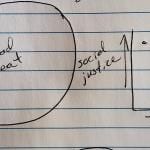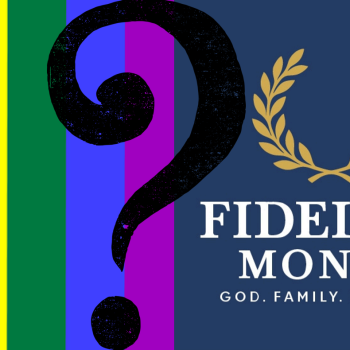No one is going to agree with you. Not all the time. Maybe not on the specifics. I know that I don’t hang out with only those who agree with me. I have friends that I think are wrong about one thing or another. But regardless the perceived wrongness, I enjoy their friendship. If we only enjoyed those with whom we agree completely would leave us alone and fragmented (more on this in an upcoming essays). Kind of like we are already.
A Joke
Can we agree on anything? Or, has our ability to finely and minutely divide ourselves from others become absolute?

In 2005, the newspaper, The Guardian, posed a contest, seeking the funniest religious joke. The Guardian explained, “demonstrating a fondness for black humour about their faith or lack of it, Christians, Buddhists, Jews, Muslims, atheists and agnostics sent 951 religious jokes to the website Ship of Fools . Readers had the chance to vote for the funniest, and the most offensive, and more than 10,000 did so.” (The Gaurdian, 9/25/2005). The winner was titled, “Bigot on a Bridge.” Here is the joke. It is one of my favorites, I’ve repeated it in many sermons and used it in many consulting gigs.
I was walking across a bridge one day, and I saw a man standing on the edge, about to jump. I ran over and said: “Stop. Don’t do it.”
“Why shouldn’t I?” he asked.
“Well, there’s so much to live for!”
“Like what?”
“Are you religious?”
He said: “Yes.”
I said: “Me too. Are you Christian or Buddhist?”
“Christian.”
“Me too. Are you Catholic or Protestant?”
“Protestant.”
“Me too. Are you Episcopalian or Baptist?”
“Baptist.”
“Wow. Me too. Are you Baptist Church of God or Baptist Church of the Lord?”
“Baptist Church of God.”
“Me too. Are you original Baptist Church of God, or are you Reformed Baptist Church of God?”
“Reformed Baptist Church of God.”
“Me too. Are you Reformed Baptist Church of God, Reformation of 1879, or Reformed Baptist Church of God, Reformation of 1915?”
He said: “Reformed Baptist Church of God, Reformation of 1915.”
I said: “Die, heretic scum,” and pushed him off the bridge.
The Point is the Fine Point
The truth of the joke is in its painful truth. Hopefully it makes us cringe. Feel free to change the topic from religion to politics, or favorite sport, or fast food, or anything. We may agree on a wide variety of foundational values. But, if at the end of it all, there is a fine point of difference, then we part ways. Or get pushed off of a bridge. Even when there is disagreement in the specific thing that separates, there is much in common above, around, and under that specific thing.
In 1998, two people split by the debate about abortion, enemies by many definitions, discovered the things upon which they agreed. Their relationship was imaginative, challenging, and brilliant. Being defined under the banner of “pro-choice,” and “pro-life”, pushed them to see each other as unrelateable and wrong. Stepping out, to see the opposite as a human being, a network for common ground emerged. Mary Jacksteit, of the Common Ground Network explained:
“The concept is frequently misunderstood. It is not an attempt to fashion a compromise on abortion, but to find other issues, such as adoption and teen pregnancy, on which the two sides can agree.”
If we see the number of things upon which we can find common ground diminishing, we need to either become more thoughtful, creative, or be willing to redefine common ground to include those we do not agree with 100%.
Even if You Think They’re Wrong, Agree to Love Your Enemies
I can’t number the things I agree with, the positions I hold. But I can list a bunch of things I don’t like. Such as my distaste of processed coconut. My aversion to the complex art of wine-tasting. Then there are the ideas I have, all correct, I am sure. Like how and when to water the lawn in the summer. My belief that churches should practice radical welcome and inclusion. Knowing correct temperature to set the air conditioner. And this is a big one, how to load the dishwasher. I’ve not even gotten to the weighty issues of politics, religion, sports teams (Go Vandals!). We can add various positions about contemporary politics, athletic events and sports teams, and theological commitments. On how many things do we have to agree to have agreeable relationships? When does disagreement break the bonds? Or, keep critical bonds from forming?
Having worked with churches in conflict for the past two decades, one of the difficult and startling features is the difficulty to listen to the wisdom of our sacred text. There is much written about the beauty of peace and unity. But there’s not much clarity about what to do with people we don’t love, but we don’t really want to call an “enemy.” That’s a pretty harsh word. But the scriptures are a bit weak on telling us how to treat someone who is an annoyance, an irritant, an opponent. Jesus refined the categories to just two: friends or neighbors in one column, and enemies in the other. As we define these categories, friends and neighbors receive kindness and support, a listening ear on hard days. But enemies, what do they get? Derision, criticism, violence, or something more?
Go Ahead, Call Me an Enemy
Jesus also redefined how we respond to and relate to these two groups, to our friends and neighbors, and to our enemies. Jesus’ fix, the way he redefined our responses is elegant and brilliant. Even if Jesus maintained the two categories: friends and neighbors on the one hand, and enemies on the other, he did collapse the two into one in one significant way. The way they are treated.
You have heard that it was said, “You shall love your neighbour and hate your enemy.” But I say to you, Love your enemies and pray for those who persecute you, so that you may be children of your Father in heaven; for he makes his sun rise on the evil and on the good, and sends rain on the righteous and on the unrighteous. For if you love those who love you, what reward do you have? Do not even the tax-collectors do the same? And if you greet only your brothers and sisters, what more are you doing than others? Do not even the Gentiles do the same? Be perfect, therefore, as your heavenly Father is perfect (Matthew 5:43-48).
Each receives the same. Love is for both. Agreeing on all the details is rarely going to happen. But the vast wealth of common values, and courage to love our enemies is not only available, but is what we long for.
Want Craig to come speak at your church, provide a workshop, or a retreat? Send an invitation HERE
For more resources from Craig, check out The Missionplace.
And, although we’re on hiatus, subscribe to
The All That’s Holy: Blue Collar Podcast available on iTunes.
Follow me and support me on my Patreon page.
















